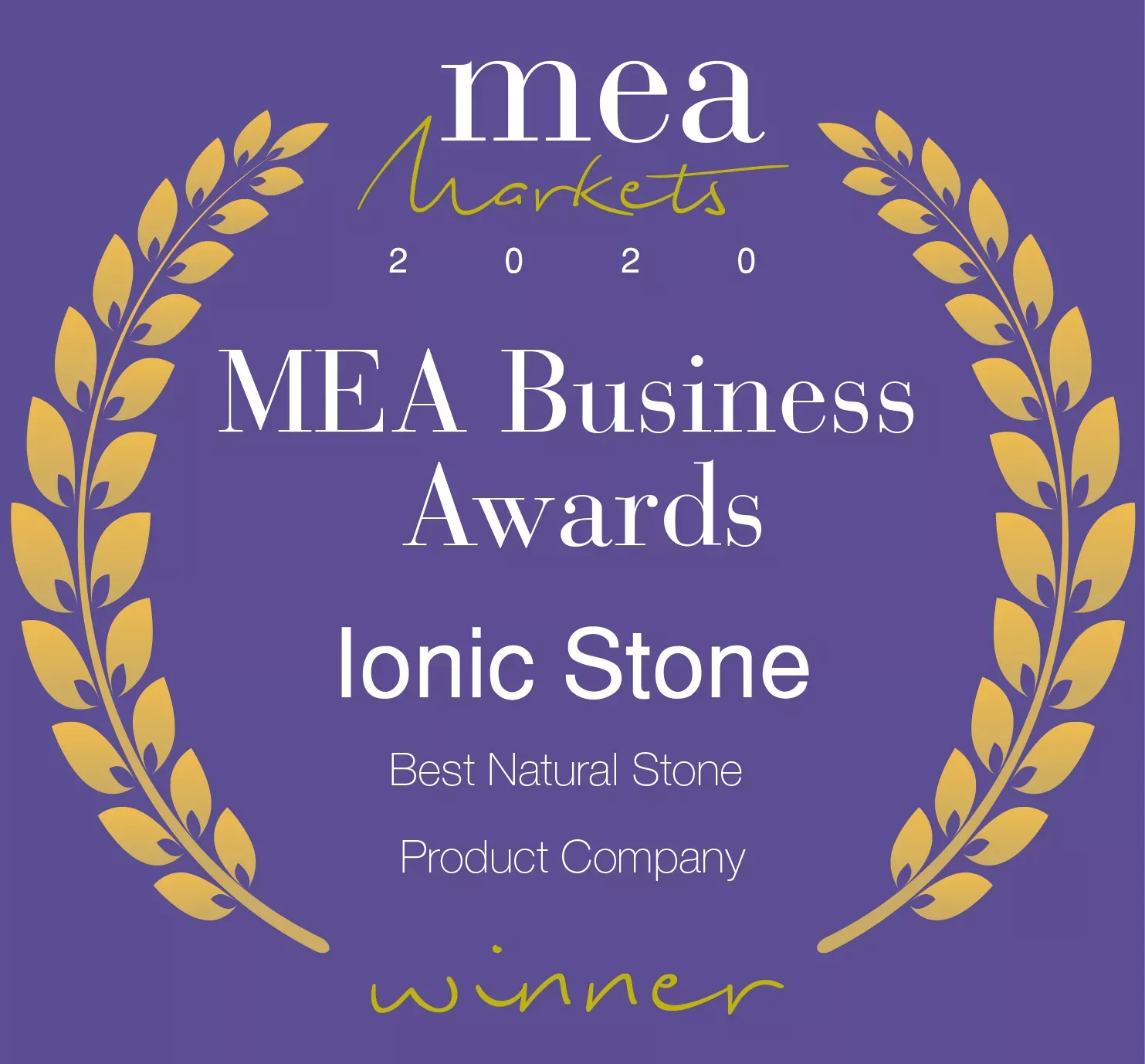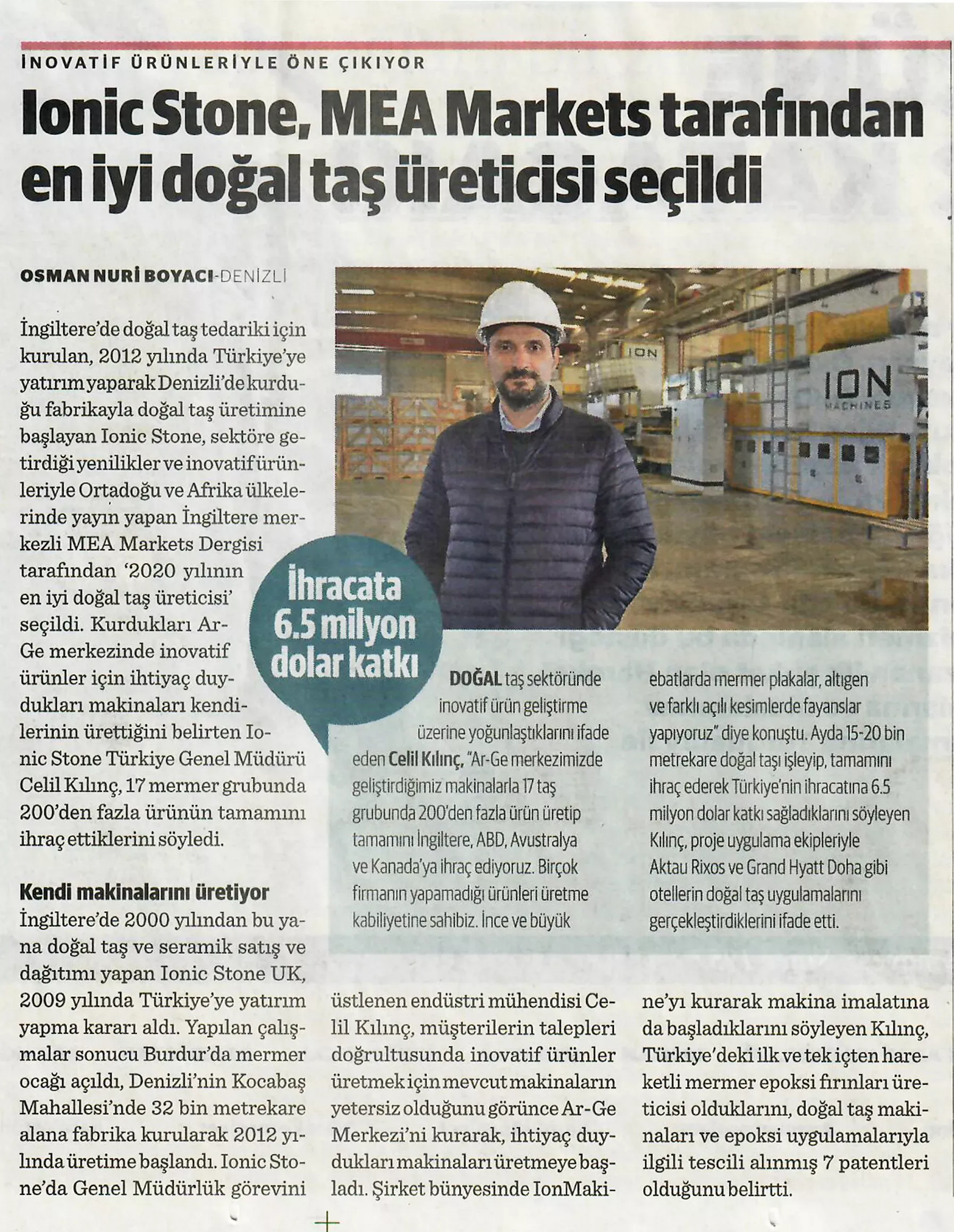Blog
2020's Best Natural Stone Product Company
Our recent award: best natural stone product company
Now known for being the UK’s largest stone distributor and project management firm, Ionic Stone set its roots in St. Albans in 2006 with a 20,000-foot storage facility. It was created to fill a significant gap in the UK’s building industry: the need for natural stone tiles of good quality at reasonable prices, a task it took to with vigour. After the global credit crisis and its survival through the tumult, Ionic Stone made the decision to enlarge the firm and move forward into stone processing. Two years later, it had opened a processing plant in Denizli, Turkey, and gained two marble quarries. Shortly after this in 2015, it added a purpose-built 70,000 square foot distribution centre in Peterborough to its operation.
In its UK operational houses alone, Ionic Stone holds over 200,000 m2 of tiles and slabs imported from its Denizli factory. This factory is a specialised processing plant that works with premium natural stone in the most cutting-edge machines. Such minerals include marble from the Taura Mountains and travertine from Pamukkale, and all are chosen and cut specifically to fit each client’s project and demands. Furthermore, although it is a mass production operation, that hasn’t stymied Ionic Stone’s creativity. Its factory cuts stone in several shapes not seen elsewhere in the market, and if the volume required is sufficient, they can cut any exclusive design at low cost. It works with the largest tile chains and building depots both in the US and UK, and has contributed to projects such as the Grand Hyatt Doha in Qatar, Msheireb Downtown Doha in Qatar, Marina One in Singapore, Hilton Baku in Azerbaijan, Louis Vitton Tel Aviv in Israel, and the Financial District Riyadh in Saudi Arabia.
It ensures it can keep the ‘iconic’ nature of Ionic Stone at the forefront with its flexible mind set regarding its clients and the projects they bring to it. Whilst it has rigid standards as to the quality it expects to deliver, it is a customer driven company that is responsive to customer requirements of unique design aspects and materials – both of which it is willing to work with the client to accomplish. At this point, having learned much about cornering the market in its industry, it now knows the rules well enough to break them. Celil Kilinc, the Managing Director of Ionic Stone, told us ‘we have to bend rules to fit in to the project environments. Furthermore, natural materials mean that no singular slab, and therefore no project, is the same; the general rules it applies are not restrictive, so that the collaboration of Ionic Stone and its customer can drive the business’s innovations forward. Uniquely, it develops its own machines to cut the shapes it develops, making it stand out in the wider stonework industry.
This and many other shapes were largely considered implausible before Ionic Stone’s pioneering work. For inspiration in a sector that tends to be rather stagnant in terms of new developments, it looked away from stonework and towards ceramics. After this, it applied its findings to create a technique that had the accuracy of a water jet to create large and thin marble tiles – something thought impossible beforehand. Having a production site based in Turkey has also granted it the freedoms it needed to flourish. Alongside the wealth of natural mineral deposits, Turkey is in the Customs Union, which makes it far easier for Ionic Stone to work with European countries.
Internally, it has a prevailing culture of finding new ways to satisfy demand in a way that none of its competitors can. This is felt at all levels of its operation, and managers are chosen for their ability to inspire a further vision in the workforce which is specific to each department. Due to the prioritisation of finding people who fit in with the family ethos of the company, recruitment can be the most challenging part of their enterprise. A single engineer could take 6-9 months to finish full orientation. Having said that, this company has found the additional tests of this process worth it to create a team that will take it even further. In the short term it wishes to increase its efficiency, undergoing a major program to increase productivity, and in the long term it is looking forward to achieving full automation. Whilst Celil Kilinc admits this is a lofty goal, Ionic Stone goes on to set the bar of 80% automation as the level at which it will be satisfied.
MEA MARKETS / 2020 MEA Business Awards

